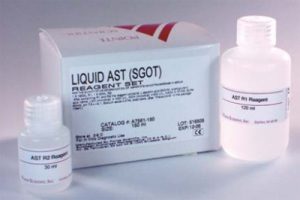
Serum glutamic oxaloacetic transaminase, or SGOT, is a liver enzyme. Another name for it is aspartate transaminase or AST. SGOT is one of the two most important enzymes among the enormous number of them produced by the liver for purposes of diagnosing liver diseases (the other being serum glutamic peruvic transaminase (SGPT), which is also known by the name alanine transaminase (ALT).
It’s an important enzyme in the functioning of the liver, playing a crucial role in the metabolism of amino acids (proteins). It should be present and doing its job in any healthy liver. However, this enzyme should not be present in the bloodstream in significant quantities.
It gets released when the liver is damaged, and so elevated levels of SGOT in the blood are a good indicator that the liver has suffered damage from one thing or another. In addition to the liver, SGOT is also found in the heart, kidneys, skeletal muscles, and brain.
Normal Levels
The normal range for SGOT in the blood for an adult is 6-
and non-
Use In Diagnostic Tests
As noted above, a test for elevated SGOT levels in the blood is normally used in conjunction with other liver enzyme tests rather than on its own. High levels of AST compared to those of ALT, when both are above normal, is a marker for chronic alcoholism. If ALT is higher than AST, that’s more typically an indicator of non-
Blood tests for liver enzymes are necessary because in the early stages, liver disease typically has no symptoms that the patient can recognize and report. By the time symptoms do appear, the damage to the liver can be irreversible and health can be permanently impacted. It’s therefore important to detect liver illnesses before symptoms appear and liver enzyme tests are very important tools for that purpose.
Liver Disease Risk Factors Indicating Blood Tests
Liver diseases are known to be associated with a number of risk factors. High alcohol consumption is the biggest single risk factor, although the majority of liver disease is non-
The presence of any of these risk factors calls for a blood test for liver enzymes, most likely to measure blood levels of SGOT and ALT. If the results of the blood tests indicate a possible liver disorder, the next step is to examine the liver using medical imaging technology such as an ultrasound. Further diagnostic procedures include lifestyle examination, and in some cases the performance of a liver biopsy which can directly test for liver cancer and infectious conditions.
It’s important to recognize that elevated SGOT can arise without any damage to the liver or loss of liver functioning. Because the enzyme is also present in the heart, the brain, the kidneys, and the skeletal muscles, and is an important chemical for the digestion and metabolism of
proteins and amino acids, elevated levels of SGOT can also show a problem with one of those other organs and systems. In particular, cardiovascular disease and damage to the heart itself can result in elevated levels of SGOT. This is, of course, also a matter of serious medical concern, but except for some points in common (e.g. both benefit from controlling body weight and reducing obesity), heart disease and liver
disease aren’t necessarily treated the same way.
Elevated SGOT Due To Anti-
One common cause of elevated SGOT other than liver disease is the use of the statin family of medications for treating high levels of low-
Elevated liver enzymes including SGOT are a frequent side effect of the medication and there has been some concern among physicians that use of statins may cause liver damage. It has now been found, however, that although elevated liver enzymes is a common side effect, actual liver damage resulting from statin use is rare. For that reason, the current practice is to treat high cholesterol aggressively through medication as well as through diet and exercise, and to monitor the liver for signs of actual damage but otherwise accept the elevation of liver enzymes as less dangerous by far than the risk of a heart attack.